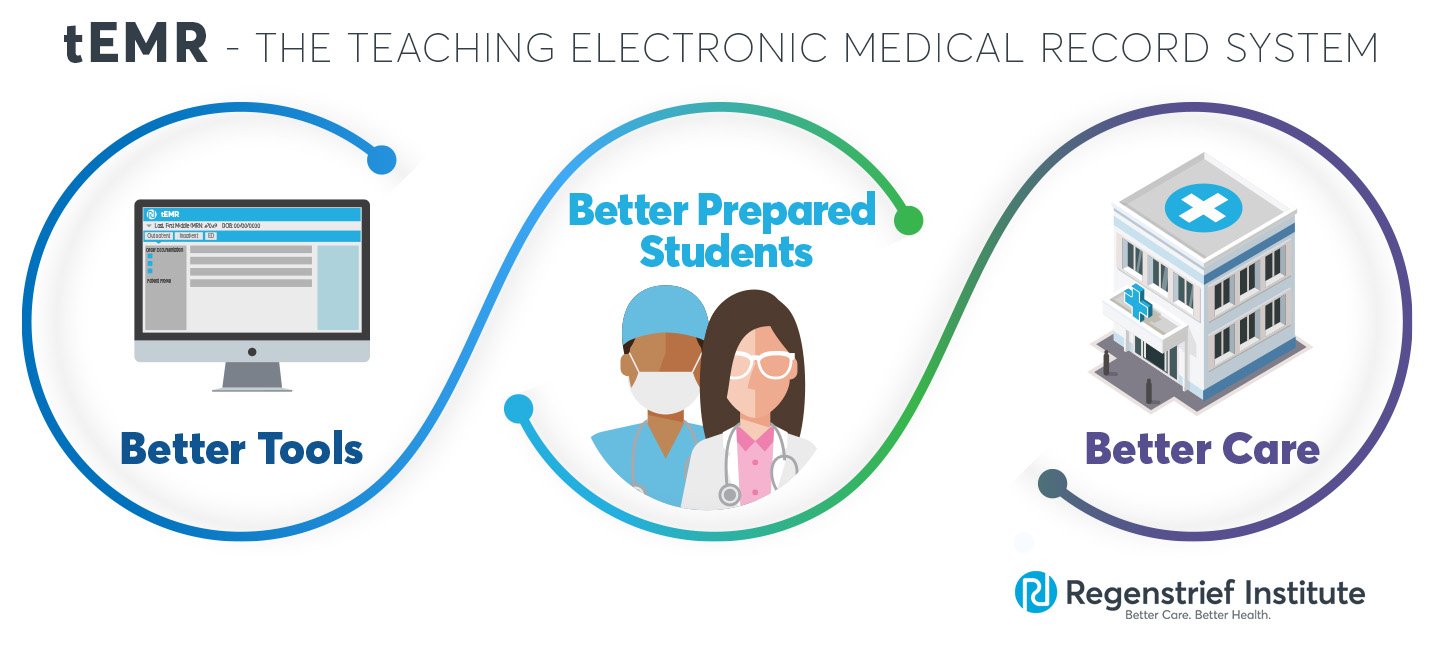Anonymized real-world platform gives learners realistic experience with health IT
As electronic medical records (EMRs) are increasingly used across the United States, the next generation of physicians, nurses, social workers, pharmacists and other clinicians need to acquire new knowledge and competencies related to use of EMRs early in their clinical education. But training is not routinely provided.
A new study presents the functions and application of the novel, scalable Regenstrief teaching electronic medical record (tEMR) platform which contains a unique, large, anonymized patient database enabling health professions students to learn how to use health information technology (HIT) to best manage the complex issues presented by real-world patients.
“HIPAA [Health Insurance Portability and Accountability Act of 1996] has restricted access to EMRs so, ironically, the more EMRs are used, the less access students have to patient data, but the more they need to know,” said Regenstrief Institute Research Scientist Debra Litzelman, M.D., M.A., corresponding author of the new study and a professor of medicine at Indiana University School of Medicine. “Regenstrief tEMR offers detailed, anonymized data on complex patients as well as unique real-world functionality including patient sharing among care team members.”
“Medical, nursing, social work and other clinical trainees who have early exposure to EMRs will think differently about patient care and about future EMR development because of that early exposure. It creates a different mindset.”
Regenstrief tEMR offers a realistic virtual patient care experience, which the study noted was especially helpful during the early months of the COVID pandemic when students’ access to patients in health care settings was limited. The tEMR platform also enables and encourages interprofessional collaboration between learners pursuing different careers at diverse locations working at the same or different times.
Professional schools often have simulation centers teaching various skills such as CPR, intubation or robotic surgery procedures which trainees need to learn before they are on the job. Similarly, Regenstrief tEMR provides real-life simulation which prepares individuals for the real-world health IT environments they will enter.
The Regenstrief tEMR was created by the Regenstrief Institute along with IU School of Medicine, Eskenazi Health and the American Medical Association (AMA). Since 2013, the Regenstrief tEMR has been used at 12 health profession educational institutions. More than 11,800 students have accessed the system.
“Regenstrief teaching electronic medical record (tEMR) platform: a novel tool for teaching and evaluating applied health information technology” is published in JAMIA Open. Co-authors in addition to Dr. Litzelman are Blaine Y. Takesue, M.D., of IU School of Medicine and Regenstrief Institute; William M. Tierney, M.D., of IU Fairbanks School of Public Health at IUPUI and IU School of Medicine; Peter J. Embí, M.D., and Burke W. Mamlin, M.D., of Regenstrief Institute and IU School of Medicine and Jeff Warvel of Regenstrief Institute.
“With the exponential growth of health-related data and the impact of health information technology (HIT) on work-life balance, it is critical for students to get early EHR skills practice and understand how EHRs work. The ultimate tEMR project aim is to create tools through which our students — future educators, administrators, practice leaders, and front-line physicians — can develop enough HIT savvy to influence how HIT should be used in health care rather than HIT dictating how health care is delivered,” the study authors concluded.
This project was supported by funding from the American Medical Association Accelerating Change in Medical Education initiative, a program that has provided more than $14 million to innovative projects at 37 medical schools since 2013, and the Regenstrief Institute.
About Regenstrief Institute
Founded in 1969 in Indianapolis, the Regenstrief Institute is a local, national and global leader dedicated to a world where better information empowers people to end disease and realize true health. A key research partner to Indiana University, Regenstrief and its research scientists are responsible for a growing number of major healthcare innovations and studies. Examples range from the development of global health information technology standards that enable the use and interoperability of electronic health records to improving patient-physician communications, to creating models of care that inform practice and improve the lives of patients around the globe.
About IU School of Medicine
IU School of Medicine is the largest medical school in the U.S. and is annually ranked among the top medical schools in the nation by U.S. News & World Report. The school offers high-quality medical education, access to leading medical research and rich campus life in nine Indiana cities, including rural and urban locations consistently recognized for livability.
About Debra Litzelman, M.D., M.A.
Debra Litzelman, M.D., M.A., is the associate director of the Regenstrief Institute William M. Tierney Center for Health Services Research and Indiana University Center for Health Services and Outcomes Research. She is also the D. Craig Brater Professor of Global Health Education at Indiana University School of Medicine.










